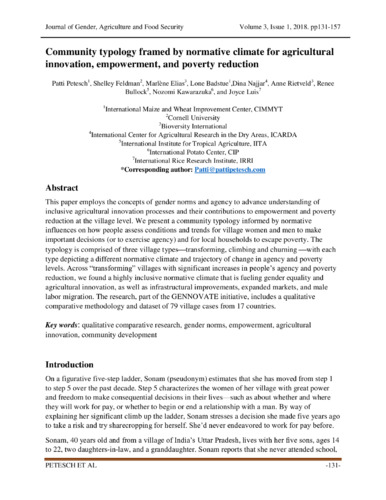This paper employs the concepts of gender norms and agency to advance understanding of inclusive agricultural innovation processes and their contributions to empowerment and poverty reduction at the village level. We present a community typology informed by normative influences on how people assess conditions and trends for village women and men to make important decisions (or to exercise agency) and for local households to escape poverty. The typology is comprised of three village typestransforming, climbing and churning with each type depicting a different normative climate and trajectory of change in agency and poverty levels. Across “transforming” villages with significant increases in people’s agency and poverty reduction, we found a highly inclusive normative climate that is fueling gender equality and agricultural innovation, as well as infrastructural improvements, expanded markets, and male labor migration. The research, part of the GENNOVATE initiative, includes a qualitative comparative methodology and dataset of 79 village cases from 17 countries.
Community typology framed by normative climate for agricultural innovation, empowerment, and poverty reduction
Citation: Petesch, P., Feldman, S., Elias, M., Badstue, L., Najjar, D., Rietveld, A., ... Luis, J. (2018). Community typology framed by normative climate for agricultural innovation, empowerment, and poverty reduction. Journal of Gender, Agriculture and Food Security, 3(1), 131-157.
2018-10-04
journal_article

